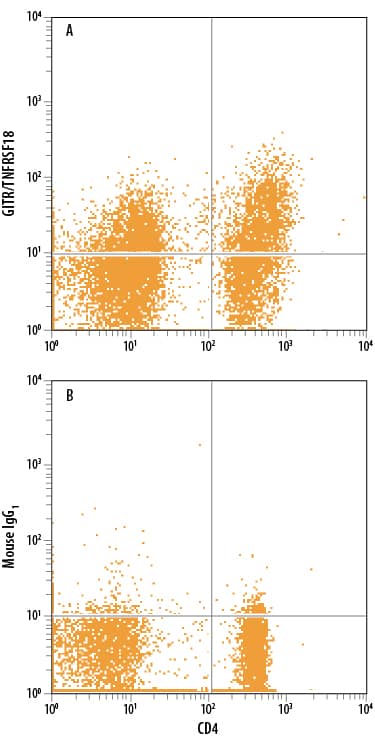Human GITR/TNFRSF18 Alexa Fluor® 700-conjugated Antibody
R&D Systems, part of Bio-Techne | Catalog # FAB689N


Key Product Details
Validated by
Species Reactivity
Applications
Label
Antibody Source
Product Specifications
Immunogen
Gln26-Glu161 (Thr43Ala)
Accession # Q9Y5U5
Specificity
Clonality
Host
Isotype
Scientific Data Images for Human GITR/TNFRSF18 Alexa Fluor® 700-conjugated Antibody
Detection of GITR/TNFRSF18 in Human PBMCs by Flow Cytometry.
Human peripheral blood mononuclear cells (PBMCs) treated with 5 µg/mL PHA for 5 days were stained with Mouse Anti-Human CD4 PE-conjugated Monoclonal Antibody (FAB3791P) and either (A) Mouse Anti-Human GITR/TNFRSF18 Alexa Fluor® 700-conjugated Monoclonal Antibody (Catalog # FAB689N) or (B) Mouse IgG1Alexa Fluor 700 Isotype Control (IC002N). View our protocol for Staining Membrane-associated Proteins.Detection of GITR/TNFRSF18 in RPMI8226 (positive cell line)/Jurkat (negative cell line) by Flow Cytometry.
RPMI8226(positive cell line)/Jurkat(negative cell line) were stained with Mouse Anti-Human GITR/TNFRSF18 Alexa Fluor® 700-conjugated Monoclonal Antibody (Catalog # FAB689N, filled histogram) or , open histogram). View our protocol for Staining Membrane-associated Proteins.Applications for Human GITR/TNFRSF18 Alexa Fluor® 700-conjugated Antibody
Flow Cytometry
Sample: - Human peripheral blood mononuclear cells (PBMCs) treated with PHA- RPMI8226 (positive cell line)/Jurkat (negative cell line)
Formulation, Preparation, and Storage
Purification
Formulation
Shipping
Stability & Storage
- 12 months from date of receipt, 2 to 8 °C as supplied.
Background: GITR/TNFRSF18
GITR (glucocorticoid-induced tumor necrosis factor receptor, also named AITR, activation-inducible TNF R family member), is a 228 amino acid (aa) type I transmembrane protein belonging to the TNF R family and has been designated TNFRSF18. The GITR cytoplasmic domain has striking homology with the cytoplasmic domain of 4-1BB and CD27. Human GITR shares 55% homology with murine GITR. GITR is expressed at low levels in peripheral blood T cells, bone marrow, thymus, spleen, and lymph nodes. In contrast to mouse GITR, expression of human GITR is not induced by treatment with dexamethasone, but is up-regulated by antigen stimulation or by treatment with anti-CD3 plus anti-CD28, or PMA plus ionomycin. Human GITR ligand was identified from human umbilical vein endothelial cells and is a 177 aa polypeptide belonging to the TNF superfamily (TNFSF18). Ligation of GITR can activate NF-kappa B through TRAF2, and protect T cells from TCR activation-induced cell death. It has been proposed that GITR ligand and GITR may modulate T lymphocyte functions.
References
- Nocentini, G. et al. (1997) Proc. Natl. Acad. Sci. USA 94:6216.
- Kwon, B. et al. (1999) J. Biol. Chem. 274:6056.
- Gurney, A.L. et al. (1999) Current Biology 9:215.
- Kwon, B. et al. (1999) Current Opinion in Immunology 11:340.
Long Name
Alternate Names
Gene Symbol
UniProt
Additional GITR/TNFRSF18 Products
Product Specific Notices for Human GITR/TNFRSF18 Alexa Fluor® 700-conjugated Antibody
This product is provided under an agreement between Life Technologies Corporation and R&D Systems, Inc, and the manufacture, use, sale or import of this product is subject to one or more US patents and corresponding non-US equivalents, owned by Life Technologies Corporation and its affiliates. The purchase of this product conveys to the buyer the non-transferable right to use the purchased amount of the product and components of the product only in research conducted by the buyer (whether the buyer is an academic or for-profit entity). The sale of this product is expressly conditioned on the buyer not using the product or its components (1) in manufacturing; (2) to provide a service, information, or data to an unaffiliated third party for payment; (3) for therapeutic, diagnostic or prophylactic purposes; (4) to resell, sell, or otherwise transfer this product or its components to any third party, or for any other commercial purpose. Life Technologies Corporation will not assert a claim against the buyer of the infringement of the above patents based on the manufacture, use or sale of a commercial product developed in research by the buyer in which this product or its components was employed, provided that neither this product nor any of its components was used in the manufacture of such product. For information on purchasing a license to this product for purposes other than research, contact Life Technologies Corporation, Cell Analysis Business Unit, Business Development, 29851 Willow Creek Road, Eugene, OR 97402, Tel: (541) 465-8300. Fax: (541) 335-0354.
For research use only
